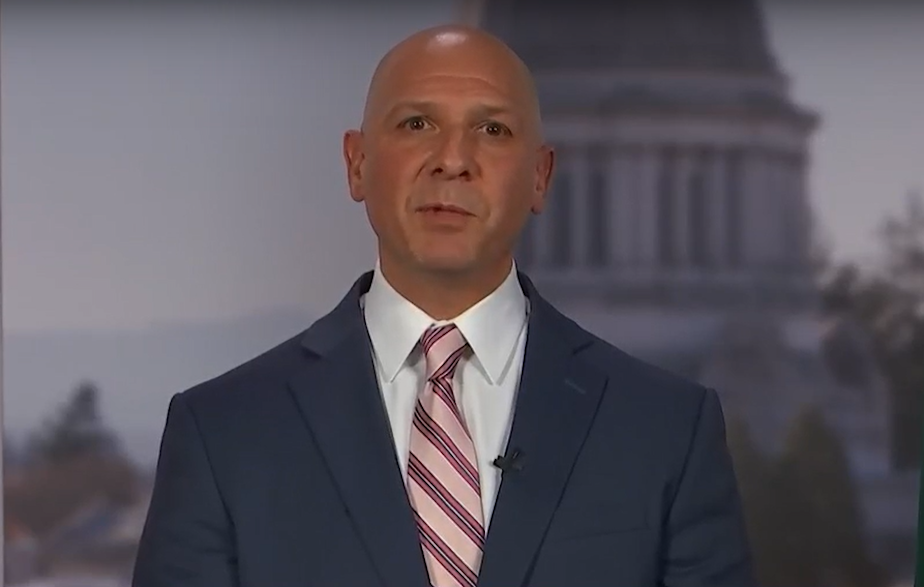'It is not too late': GOP responds to Inslee's 2023 State-of-the-State address

Washington's Republicans and Democrats may agree on which issues and challenges are most urgent in the state, but if there was one point made clear in the GOP response to Gov. Jay Inslee's State-of-the-State address Tuesday, they don't agree on what to do about them.
The address focused on a handful of core issues, providing a preview of hot topics the Legislature will pick up this session: homelessness, housing, behavioral health, climate change, public safety, and education. In turn, Inslee hyped aspects of his proposed budget under consideration by lawmakers this session.
RELATED: Gov. Jay Inslee's 2023 State-of-the-State address
Republican Rep. Peter Abbarno offered the GOP’s take on the status of Washington.
“There are those in power who, year after year, sell us a future based on fear,” Abbarno said. “They would have us believe the status quo is the best we can hope for, because for many of us, that is all we have ever known for a decade of the same people promising change that never comes. But I don’t believe that. I believe that by charting a new course, based on real solutions, that Washington’s best years are ahead of us and that we have it within our power to leave this beautiful state better off for our children and grandchildren.”
Sponsored
Abbarno, of Centralia, represents Washington’s 20th District. In his response to the governor's address, he laid out a list of state priorities that mostly echoed Inslee's talking points delivered just minutes earlier. But woven throughout his statements was an argument that the governor and state Democrats have already attempted to solve these issues with their own policies, but the problems having grown.
“A decade of the governor’s speeches, just like the one you heard, and continued reckless spending have not produced the results we all deserve. I’m here to tell you that it is not too late, and there are reasons to be hopeful about our state’s future, a state blessed with an abundance of natural resources and human ingenuity.”
Abbarno further argued Washington can overcome its challenges, “by trusting you, by providing you the tools and opportunities to blaze your own pathway to success.”
"Tools and opportunities" that Abbarno points to are:
- Lower the state’s sales tax, which hits lower-income and fixed-income residents harder
- Property tax relief, while building more homes
- Expand the working families tax credit
- Invest in education, early learning, and childcare for working families
Sponsored
“Child care is just not accessible or affordable,” Abbarno said. “Unfortunately, the governor and his party have neither provided meaningful economic relief nor created opportunities for families to succeed. As a result, many families are stuck in what feels like a hopeless cycle of struggle.”
Abbarno proposes the state roll back regulations preventing new housing, while working with local governments to create more units and increase density.
“For years the governor and his majority have spent billions of dollars on housing programs while housing accessibility and affordability have only worsened. In fact, Washington has fewest housing units per household of any state in the country — the governor’s polices have put us last in the nation.”
Similar to Inslee’s address, Abbarno linked Washington’s housing woes to the homelessness crisis.
“Let’s stop measuring success by the amount of money spent, but instead by the number of people we lift out of poverty, help address their mental health, and support life in sobriety.”
Sponsored
Public safety was also a key issue for Republicans and Abbarno took aim at Washington’s recent police reforms.
“Every one of us in the past few years has either been a victim of crime, or know someone who has,” Abbarno said. “From property crimes, to violent crimes, many communities are just not safe, or don’t feel safe. Washington now has the fewest law enforcement personnel per capita … the 2021 anti-police bill supported by the governor and his party had disastrous consequences. While the Legislature addressed some of those issues last year, critical work remains, including restoring the ability for law enforcement to pursue suspects in their vehicles; the need to recruit, train, and retain new officers; and provide law enforcement the necessary tools to keep us all safe.”
Abbarno further pointed to the state’s Blake decision, which he argued “normalized” the sale, distribution, and use of drugs like fentanyl. He added that the state needs to work more on preventing repeat offenders from getting back onto the street.

